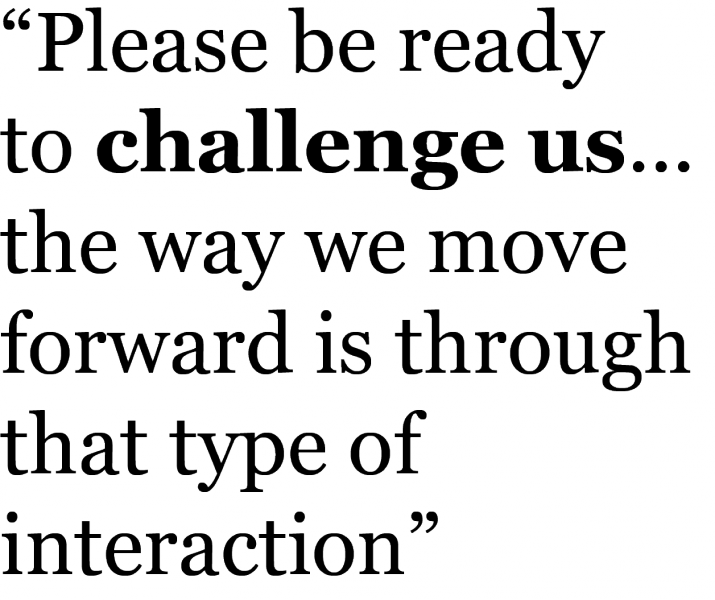SE Forum Update: A Conversation With Norbert Kriebel
Forrester hosts its Sales Enablement Forum in Scottsdale, Arizona, on March 4 and 5, 2013. Attendees will engage as a community with a shared focus on driving revenue, hear success stories in process from their peers and leading B2B practitioners, become immersed in the latest thinking and data from Forrester including face time with analysts, all in the comfort of the Camelback Inn Resort & Spa. Over the next three weeks, Marketing Mondays will spotlight the themes of the forum through a series of Q&A sessions with attending analysts. This week I sat down with Norbert Kriebel to discuss his track at the upcoming forum.
Brad Holmes: Hello Norbert, thanks for taking the time to chat with me today. You’re leading the track “Satisfying Your Changed Buyer” at the upcoming Forum For Sales Enablement Professionals in Scottsdale, Arizona, on March 4 and 5. Can you walk us through what you will be discussing during that track?

Norbert Kriebel: There are a couple of pieces that are going to fit into this track. One is, as the title says, about the changed buyer. What to consider here is that people have to write in a different way, from a content perspective and from a writer’s perspective. If buyers themselves, and the approach we have taken to get to our buyers, have changed completely, it becomes a much more complex problem in the sense that organizations need to realize "Hey, there is a big shift that’s happening here!” It’s not just a shift in terms of one small tactical element, but it’s a shift in terms of how the whole organization behind the selling system actually connects and communicates with buyers.
BH: Say more.
NK: There are multiple different components that are involved in that: the development of the content that goes to the buyers (whether it’s going to be product-focused or buyer-focused), the structure of the information (it’s a different structure to talk about buyers – their roles and their business issues – than it is to outline the features and functions of your product), and the delivery of that information (not just in terms of the sales person communicating with the various different buyers, which is a delivery channel, but also, how that information is delivered to the salespeople). Rather than give sales a massive binder and say "Go study this and understand it," we should provide them with a just-in-time environment where they can get the information, use the information, and share the information with their clients.
BH: How?
NK: Well, behind this idea is a whole system, including how this content is being created. This doesn’t just involve marketing groups who put together web pages and brochures, it involves portfolio groups, the ones who originally are organizing the content and the capabilities of the organization into various different packages. Those packages are very focused on "What is the product that I’m bringing market?" as opposed to how it was originally stated "I am building this capability to solve the various specific buyer needs." So there are multiple layers of translation internal to the organization; there’s a different understanding in terms of who the material is being written for (both in terms of to the buyer and to the seller who is communicating to the buyer) and then, finally, the change in terms of alignment to different departments in order to achieve that objective.
BH: At the Sales Enablement Forum there will be different tracks, themes, and speakers outside of your own. Are there any that you are particularly excited to see or, in a related sense, is there any track in which people who may be focused in on your track may not expect to get value from, but will in attending the forum?
NK: Yes, definitely. Directly on my radar are two tracks. The first is from one of our guest speakers, Thierry van Herwijnen, who is the Head of Sales Enablement at Cisco. He’ll be talking about Cisco’s approach to designing content which supports its strategic sales objectives. The other one is Lori Wizdo and Peter O'Neill’s track on demand management. And, of course, I am looking forward to the keynote from Dave Frankland. Ultimately, all of these tracks are interrelated. This isn’t the type of conference where the tracks are designed for different silos; it’s exactly the contrary. What we’re doing is inviting all the silos (the portfolio groups, marketing, sales, and the executive leadership in those groups) to attend so we can bring these different perspectives together in one environment where we can jumpstart the process to understanding that this isn’t an issue which gets solved in a single department or an isolated functional area; it really requires the combination of all these people coming together.
BH: Sounds great. For those attendees, as well as people who have never attended a Forrester forum, how would you explain the value of attending a forum over reading the typical Forrester deliverable, which might be reports, webinars, or something else they can access from their office at work?
NK: The research as it is available online provides a tremendous amount of information based around reason and rationale. So that is, what is the problem? What is the rationale around this problem? Why does this problem exist? Then, here’s how you can apply various technologies and practices to address that particular problem. If you think about the way of transferring information, from the heads of our analysts into the heads of our clients, the amount of information we can transfer through a document is limited; documents are less equipped to handle the incremental and ongoing changes that the forum is helping our clients achieve. By attending the forum, it’s an acceleration for our clients. In the sense that, one, the various pieces are being tied together and presented in a live format, which, when it comes to absorbing information, you always absorb more when there’s a speaker, there’s a visual component, and when it’s interactive. That word interactive goes into my second point on this. The Sales Enablement Forum is absolutely an interactive event. Different from many events where you sit and listen, go to the next session, sit and listen, we’ve designed the forum in two different stages. One is the high level keynotes, but attendees will spend a lot of time in the breakout sessions, which are all designed to be very interactive. They are specifically designed to give our attendees the ability to dive deeper into a particular issue and discuss with peers, with colleagues, and with the analysts involved.
BH: If there are any specific reports, webinars, or blog posts would you recommend attendees to view before the forum, what would they be?
NK: There are two reports that I would say are important for people to read before the event. One is a report recently published by Scott Santucci called Introduction To The Value Equation Framework. This one is important because it sets up a very important idea around understanding how value and the perception of value are built in the minds of buyers. The other report which I would say is good for attendees to take a look at is Engineering Valuable Sales Conversations. The reason I mention these two reports is that Engineering Valuable Sales Conversations really provides a dialogue around this change of go-to-market versus go-to-customer. And that is, at the macro level, the big shift within sales enablement. More granular from there, and this would be targeted more to people who are in a specific content creation process, is the idea of the value equation. Because once we shift our focus from go-to-market to go-to-customer, now there is a much more specific target, and as you think about this target, you should focus on what is creating value in their mind. And that’s where Introduction To The Value Equation Frameworkcomes in, because it is very specific in terms of understanding the differences valuing something on an intrinsic level (the product’s own value, something like an iPhone) versus the subjective value (how do you see the value of a 60” TV versus how do I see the value of a 60” TV).
BH: Is there any additional information you would want readers of the blog to know about the forum?
NK: Two things I want to say to people attending the forum: One, I’m looking forward to seeing you there! The second is, challenge us! Please be ready to challenge us, be ready to discuss and debate; the way that we move forward is through that type of interaction. And the more interactive that you are, in terms of participation in the panels, in terms of engaging us in one-on-one’s, even grabbing us in the hallways and having a conversation with us, those are all pieces that are essential to the success of our clients as well as the ongoing success of our research and ultimately driving more knowledge back out to the community.
BH:Great answers, Norbert. Thank you for the interview and we look forward to hearing from you in Scottsdale!
Thanks for reading, check back next week for a spotlight on guest speakers who will be speaking at the forum.